- Home
- Kim Newman
The Night Mayor Page 4
The Night Mayor Read online
Page 4
‘Well,’ said Susan, ‘shall we go?’
‘Right away, Ms Bishopric.’
The andrew strode out first, Susan followed, with Juliet last out. Susan was uncomfortably aware that the possibility of her making a bolt for liberty had been taken into account. The marshal stood aside while Susan sealed the door. The electrodes crackled, and shutters came down over the windows. The Household defence system came on line. If she turned round, Susan felt that she would find Juliet’s hand resting lightly on the butt of her taser, a polished red fingernail on the safety. Such intuitions were part of the Talent – she had long since got used to them. Not once had she been able to divine anything useful, like the outcome of the Rodney ballot or, now, the details of her conscription task.
The other andrew in the team stood by the skimmer. Its face was standard issue, but it wore a leather flying helmet with cracked green goggles. She had seen the type in flatties like Wings, The Dawn Patrol and Von Richthofen and Brown. That had been several wars ago; if the gear were genuine, it would be a valuable antique.
Susan looked up at the unseasonably bluish sky, and saw the regular London/Eng-Richmond/CSA airship pass overhead, punching a doughnut hole in a cloud bank. She recognised the stars and bars of Dixieland Dirigibles Inc. on the trefoil.
She had an urge to stick a music in her ear, and let the whole thing pass her by. Instead, she asked Juliet, ‘Will we be travelling far?’
Juliet paused, judging how much to tell. ‘Not internationally, the skip won’t take more than thirty minutes.’
‘The West Country, then?’
Juliet tried to look impassive. Susan knew she had scored some points, but couldn’t decide whether they were upsies or downsies. The skimmer’s belly opened, and the pilot andrew helped Susan climb into the rear cab. Its touch was surprisingly gentle. Its hands were upholstered over steel bones. If marshalled properly, the artificial fingers could save a life in surgery, or squeeze out Susan’s with a nerve pinch. Juliet and the bag-carrying andrew joined her in the cab, and the pilot hauled itself into its cockpit. Susan heard the swish as the andrew melshed with the skimmer. When the readiness tone came, Juliet palmed the andrew authorisation plate and the skimmer rose vertically. Susan looked down at her home, and said a silent goodbye to the fish.
Gingerly, Juliet mentioned that she had just finished dreaming The Parking Lottery. ‘I hear you’re up for Rodney.’
‘Several.’
‘Think you’ll beat Orin Tredway?’
They talked trivially, and Susan gathered Juliet was a Dreampuff. The woman seemed to have put her head through everything she had ever done. Even The Light of the Bright World Dies. Susan switched into her conventional politeness mode, and said all the things she usually said when people asked her the questions they usually asked. ‘How does it feel when you Dream?’ ‘Do you have to experience all those things you put in your Dreams?’ ‘Where do you get your concepts?’ ‘What about the sex; I mean, how do you make that up?’ ‘When did you realise you had the Talent?’ ‘Do you know John Yeovil?’ Juliet seemed less like Vanessa Vail now. She was almost unimaginative enough to qualify as an intervidier for the Breakfast Net.
The conversation prevented her from wondering what her Public Service was going to entail. She wondered if Juliet had been ordered to distract her with chit-chat. The marshal seemed to relax a little, but Susan still nursed the underlying suspicion that even curled into the skimmer couch and asking googy Dreampuff questions, Juliet had calculated all seventeen ways of dealing a deathblow.
The skimmer made good time from London to the West Sector. Mostly, they zipped over the Designated Green Areas, although Susan caught a good whiff – even through the filtrators – of the renowned Cellophane City smell. The andrew flew them low over the moorland to avoid clouds and airships. They even buzzed a cow or two. One tiny-headed animal was so startled it fell over, its mountain of meat pinning it down. A farmer strode across the fields in his twenty-foot agri-walker, scrabbling to rightside the beast before it choked itself. He raised an angry waldo grabber at the skimmer, and veed up two butcherblades. The countryside below got a little wilder.
‘This is Dartmoor, isn’t it?’ Susan asked.
‘Uh-huh.’
‘Aren’t there barrows here? And sarsen stones?’
‘I think so. That’s why it’s a preservation stronghold. Well, most of it. We’re nearly there now.’
The skimmer slowed, and set down in front of a modern complex built in the fashionable colossal style. Black towers ringed the field. Although it had been renovated completely with the Yggdrasil hook-up, the place still carried its ancient associations. Susan thought of The Hound of the Baskervilles and fugitives alone on the wetland, cringing in holes while tracker dogs pulled at their leashes, terrified now more of the freedom of the bottomless mires than the captivity of stone blocks and iron bars.
‘End of the skip,’ said Juliet. ‘Princetown Jail.’
5
Mrs Quick’s little boy Richard had problems.
I knew how the picture would look to Poverty Row’s finest. I could see the catalogue description: slightly damaged but beautifully framed. In their gumshoes, I’d think the same. When you find a dead racketeer in an apartment with a private detective who’s been hired to kill him, you don’t waste time looking for superfluous suspects. Or a murder weapon, or truth and justice. Said detective gets a nice little fall, two lungfuls of cyanide smoke, or a short walk with a chair at the end of it.
My head still hurt, and the sirens – getting louder by the second – weren’t helping. The atmosphere in the penthouse had never been particularly healthy, but I had the impression it would be getting positively cancerous within a minute or two. The sirens cut out. I heard car doors being opened and the unmistakable sound of policemen falling over themselves in their haste to get to a crime scene before the Inquirer.
I took one last look at the Night Mayor, spat on his face, and left the penthouse. The landing was empty except for the statue of some dog-headed Ancient Egyptian, but the creeping arrow indicator above the elevator doors told me someone was due directly. I hit the stairs, and got down a flight or two when I heard someone coming up. Someone overweight and in uniform. I plunged through a set of double doors, and crouched down low behind them in the near-total darkness, holding the handles to prevent give-away swinging. My tracks in the dirt would mark my path eventually, but I was hoping the cop on the stair detail would be too concerned with heaving his bulk up to the top of the shop to cast his flashlight about in an orderly, police-procedural manner.
I heard the cop waddle past, muttering under his breath. Whoever was in charge obviously had it in for him. Me, I’d have sent the youngest, fittest guy on the squad up the stairs, but the law-enforcement mastermind I was up against obviously favoured spite over good police work. That might be worth knowing.
Then my heart stopped. I couldn’t hear the cop moving any more but I could hear his very loud and asthmatic breathing, and I could dimly see myself. He had stopped on the landing after all, and his flashlight was shining through the grime-and-chickenwire windows. Officer Tubs put his face near the window, lit from below like the boogeyman.
I was caught.
And I had to keep myself from laughing out loud. I recognised the man in uniform, and knew how terrible I would feel when the Inquirer ran a headline lionising the dedicated policeman who had finally brought the killer in. Another Fine Mess.
Then the light moved. Officer Hardy had just been taking a rest. He stumbled up the next flight, and I was in comfortable darkness again. A darkness relieved only by a few shafts of moonlight through inadequately shuttered windows. That’s another anomaly of the City; heavy cloud cover outside, but moonlight indoors. You get used to it. I brushed dust off my knees, and looked around for a way out or somewhere to hide. I assumed the police had enough smarts to post a man outside to watch the fire escapes.
The corridor revealed that the Monogram was a haven for just-going-ou
t-of-business businesses. The glass-fronted doors told me this floor had at one time supported such deadbeats as Chas. Halton, Bail Bondsman, Marcel Dalio, Tattooist, and Henry Hull DDS – Painless Dentist and Plastic Surgeon (No Questions Asked). There was a trail of still-fresh blood leading up to that last office, and a torn-away tragedy mask of stained bandages outside. Someone’s new look hadn’t turned out as well as he had expected. The glass was mainly cracked and distorting. Lloyd Nolan, Private Enquiry Agent, had a couple of bullet holes in his door. The faint chalk outline of a very fat man was traced around some indelible smears between a pair of ugly, overflowing stand-up ashtrays. I cursed the Monogram’s janitorial staff. With this amount of fifth on the floor, I would be as easy to find as Theseus in the labyrinth.
I reached into my trench coat and found I had my gun back. That was something. I took out the snub-nosed automatic, and it felt good in my fist. I felt like shooting someone, which was a sure sign I had been on this case too long. The gun talked to me, gave me ideas.
If I shot myself, maybe I’d wake up. Maybe I wouldn’t be a vegetable. Maybe my head wouldn’t explode in the dreaming cradle. Yeah, and maybe if I doused myself in gasoline and lit up a cigarette I’d get a nice winter tan.
There wasn’t any easy way out.
I walked down the corridor and found the elevator doors. I nerved myself up, and stabbed the call button. The cage grumbled down and stopped in front of me. I held the steel-mesh curtain aside and stepped in. The contractible cagefront slid shut again, criss-crossing me with cicatrice shadows. I punched for the ground floor, and the elevator slunk downwards. Floors passed me, desolate still lives beyond the metal net. I saw Escher patterns in the metalwork.
I composed myself, pushed my hat to the back of my head, and tried to look stupid. Like a cop. I held my gun by the trigger guard, between thumb and forefinger as if it were a week-dead haddock.
When we hit the ground floor, I pushed the mesh aside and walked smartly towards the main doors. There were uniformed cops in the foyer, milling about. I recognised Joe Sawyer, but the others were just faces.
‘Evidence,’ I told Sawyer, with hollow confidence, holding up the gun. ‘The lieutenant wants this down at the crime lab swiftkick.’
Sawyer piggily looked back at me, raising a nightstick to his shiny wet cap-peak in a vague salute. I smiled on one side, like Dick Tracy in the funnies, and put my hand out to push the street door…
‘That’s one of the men,’ came a whine, ‘the middle-sized one.’
I did a Billy the Kid trick with my gun, and was holding it properly again. I turned round fast but carefully, and levelled it.
Byron Foulger had grabbed Sawyer’s arm, and was snivelling all over him, eyes agleam with the prospect of reward money. Or maybe just the chance to make someone more miserable.
‘Don’t move, coppers,’ I said, not liking the sound of it.
Luckily, Foulger had Sawyer’s gun arm. The cop still had his nightstick up, but I was out of reach. I backed into the door, and it gave behind me. I felt cool air. I was stepping out to freedom. Then, the door suddenly swung the wrong way, hitting me in the back, and something tried unsuccessfully to walk through me. Sharp-ended fingers touched me just under my collar, and I felt the shove. I put my hands out, and took the fall on my wrists. I hurt the meat of my palm on my gunbutt. Sawyer pushed Foulger into a heap, and a shot went wild above my head. Someone shouted, and something behind me growled. I didn’t like the growl; it reminded me of the moonlight upstairs, bright enough to suggest a full moon outside.
The cops all had their guns out now, and I was trying to put my hands up. But it’s difficult to surrender when someone is standing on your back. I felt bare, barb-toed feet digging into my vertebrae and tried to look up. The cops started shooting, but mercifully not at me. The someone on top of me walked forwards and I was able to stand up. My clothes must have been a mess, but my hat hadn’t come off. A large, swelling figure stood in the open door of the Monogram, between me and the posse. The cops were shooting at his broad chest, and he was taking all the bullets like popgun peas.
I suppose I should have been grateful, but from the back I didn’t like the look of him. He was wearing only the tatters of a pair of grey pants, and had a Weissmuller physique. He raised his sinewy arms and howled into the lobby, flexing and unflexing his claws. I saw huge slabs of muscle shifting under a thick grey pelt. His head was in shadow, but I could swear he had pointed ears, a snout, too many teeth, and eyes that shone like fat fireflies. He jerked as the cops’ bullets went in, but kept standing.
He stretched out a hand and scooped a wildly firing policeman off his feet. I cringed sideways, and just managed to avoid the cop as he tumbled through the air, a jagged lump of clothing and flesh ripped from his chest. Instinctively, I emptied my automatic into the thing’s back. Little tufts raised where the slugs went in, picking out a pentagram. My automatic was full again, so I tried to fill an imaginary circle in the back of the creature’s head. Spittle flew as he half-turned towards me, and I thought better of staying around.
I ran down the street, leaving Sawyer and company to take care of this intruder from someone else’s plot. I wondered if any of the cops were loaded with silver bullets.
My music stabbed into me with shrill violins as I splashed through the puddles of Poverty Row. I looked down at my feet and saw the sidewalks shift beneath me as I ran on. Reversed signs shattered under my shoes. I zigzagged, running more often than not down the middle of the road. Cars passed me by, ignoring my obvious distress even when I flapped my arms, trying to flag them down. I realised I was still clutching my gun like a comforter blanket. Still, I ran. There was water in my shoes now, soaking my socks, and the cold was climbing up past my ankles.
I pushed through crowds and staggered down deserted alleyways. I knocked over newsstands and bounced off delivery trucks. Crouching against a wall, I saw my own face staring guiltily down at me from a WANTED poster. There was a reward out for me, posted by something called the Cicero Club. Police cars prowled past, searchlights stabbing the darkness for me. Knots of people saw me coming and whispered among themselves, turning up their collars to shut me out of the game. Every cop in the city was after me, and I knew Daine’s underworld connections would have spread the word to have me pencilled out of this draft by now. Nobody loves you when you’re down and out and wanted for murder.
In the French quarter, I saw a Gestapo staff car draw up outside an estaminet and heard Raymond Massey describe me in gutturally accented English to a group of swarthy collaborators. I dodged seemingly random shots from the snipers on the roofs. There were Vs painted on all the posters of the Führer Anton Diffring, and bulletholes at chest height on most of the walls.
Staggering down one well-lit main street, going from bar to bar, I tripped over Sterling Hayden. He was bleeding to death in the gutter, one hand trying to hold his stomach in, the other clutching a battered suitcase held together by travel stickers and string. He groaned as I stumbled, and my foot caught the catch of the case. It sprang open and a wind from nowhere whipped out the loose hundred-dollar bills stuffed inside. A cloud of mimeograph-grey money enveloped me for an instant, bills whipping my face, and scattered away. Pedestrians snatched bills from the air, scooped soggy currency from the sidewalk, watched as the valuable cloud took off like a hot-air balloon, twisting in a faintly manlike shape, ascending to the skies. It was the Genie of the Bank, willing to bestow three wishes on anyone who would set him free of the vaults, but skilled in the arts of irony and deception. All his promised were razor-edged with hidden dangers, loopholes and lessons. Those wise enough to save the last wish usually begged for death. Sterling turned over and laughed painfully, a treacle trickle snaking from his mouth. He died with eyes open, leaving a million dollars to the four winds. That was The End of his plot, and I thought I could see a touch of relief, of transcendence, in his dead smile.
But I was still strapped into my life, bound by a plot I could n
o longer predict, condemned to ride the streetcar until the last stop. A police car turned into the street, searchlight sweeping the asphalt like a Martian heat ray. I wiped wet money off my face, and ran again.
Hiding briefly between the garbage cans by a diner, gasping for breath, I overheard an announcer cut into a programme of dance music from the Starlight Lounge of the RKO-Radio Hotel and broadcast my description.
‘This man is armed and dangerous, and should be shot down on sight or turned over to the police. In addition to the contract killing of Truro Daine, he is believed to be not only the mastermind behind the string of so-called “Pajama Suicides” that have so baffled Inspector Lestrade of Scotland Yard, but also the ape trainer responsible for the infamous Murders in the Rue Morgue, the mechanic who serviced Amelia Earhart’s plane before she took off on her last flight, and the man who shot Liberty Valance.’ As an afterthought the announcer added, ‘This interruption is not part of the scheduled Orson Welles and the Mercury Theater of the Air presentation, The Black Path of Fear by Cornell Woolrich. This is a genuine interruption and should not be misconstrued as a bizarre prank.’
His voice changed pitch from urgency to solemnity and he trailed a later programme. ‘In two hours’ time, we will broadcast a tribute to Truro Daine, the great humanitarian who has so suddenly and tragically been taken from our City by this senseless crime. Among those who have hurriedly assembled in our studios to air their heartfelt feelings in this hour of mourning are Mayor Brian Donlevy, famed criminologist and broadcaster Qaude Rains, philanthropic businessman and pillar of the community Edward Arnold and noted psychic consultant Otto –’
A customer yelped, and the drudge behind the bar spun the radio dial until music sounded out again. The young, high-voiced Frank Sinatra did what he did with ‘Night and Day’.
I pushed away from the diner, and propelled myself across the street. For no reason I could tell you, I appealed for help to a corpse-thin, bald man in his shirtsleeves who sat on an empty beer keg in a doorway, playing solitaire on a fold-out table, chewing an unlit cigar. I went down on my knees and begged him to take me in, to give me shelter, food, a place to sleep, a new face, a forged passport, a ticket to Peru, a hot drink. He continued to turn over the cards, never lifting his eyes from the configurations on the baize, saying nothing. Finally, I ran out of words and just sobbed. Then I ran out of sobs and slumped on my knees in front of the man’s doorway.

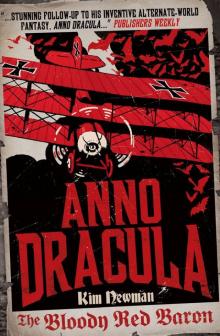 The Bloody Red Baron
The Bloody Red Baron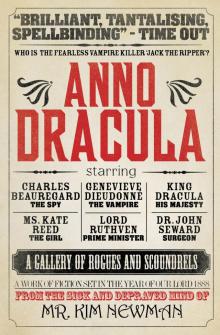 Anno Dracula
Anno Dracula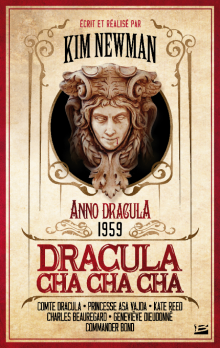 Dracula Cha Cha Cha
Dracula Cha Cha Cha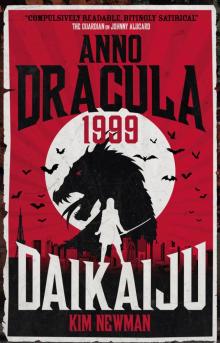 Anno Dracula 1999
Anno Dracula 1999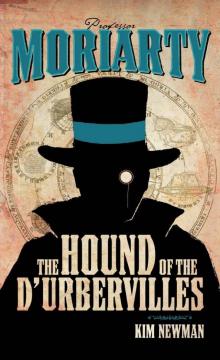 Moriarty: The Hound of the D'Urbervilles
Moriarty: The Hound of the D'Urbervilles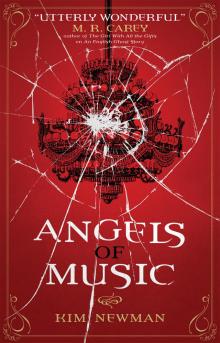 Angels of Music
Angels of Music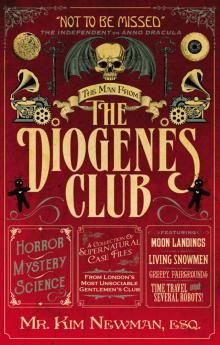 The Man From the Diogenes Club
The Man From the Diogenes Club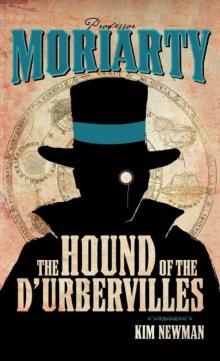 Professor Moriarty: The Hound Of The D’urbervilles
Professor Moriarty: The Hound Of The D’urbervilles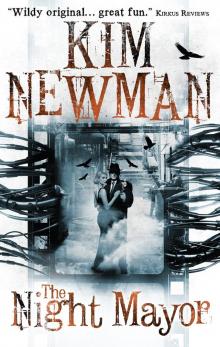 The Night Mayor
The Night Mayor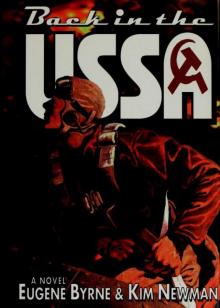 Back in the USSA
Back in the USSA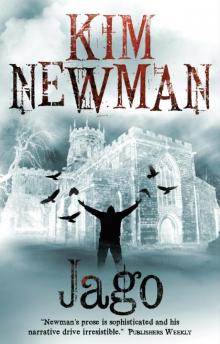 Jago
Jago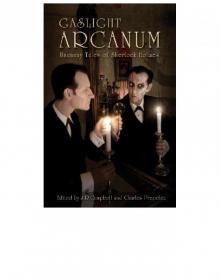 Gaslight Arcanum: Uncanny Tales of Sherlock Holmes
Gaslight Arcanum: Uncanny Tales of Sherlock Holmes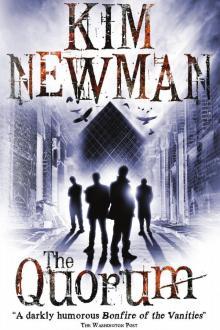 The Quorum
The Quorum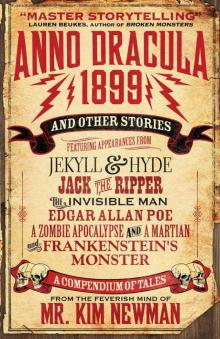 Anno Dracula 1899 and Other Stories
Anno Dracula 1899 and Other Stories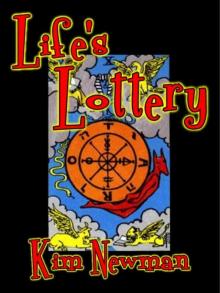 Life's Lottery
Life's Lottery The Secrets of Drearcliff Grange School
The Secrets of Drearcliff Grange School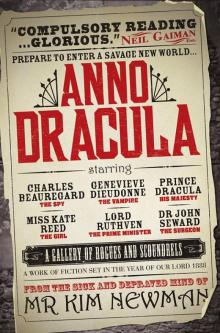 Anno Dracula ad-1
Anno Dracula ad-1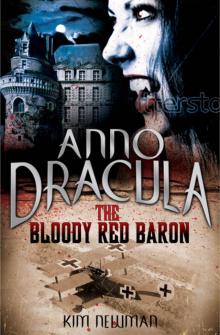 The Bloody Red Baron: 1918 ad-2
The Bloody Red Baron: 1918 ad-2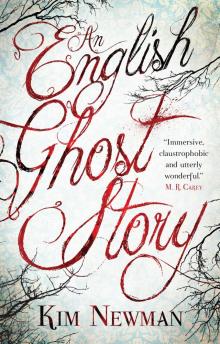 An English Ghost Story
An English Ghost Story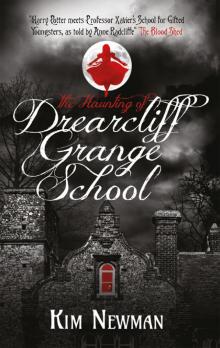 The Haunting of Drearcliff Grange School
The Haunting of Drearcliff Grange School The Other Side of Midnight
The Other Side of Midnight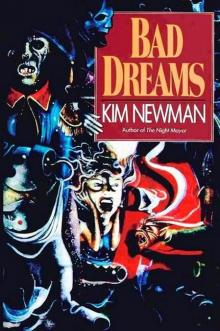 Bad Dreams
Bad Dreams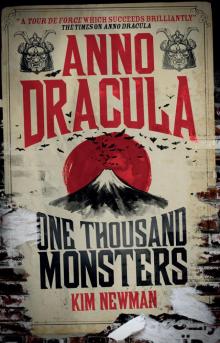 Anno Dracula--One Thousand Monsters
Anno Dracula--One Thousand Monsters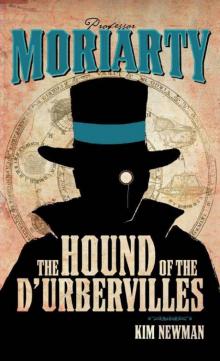 The Hound Of The D’urbervilles
The Hound Of The D’urbervilles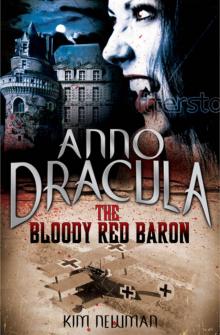 The Bloody Red Baron: Anno Dracula 1918
The Bloody Red Baron: Anno Dracula 1918